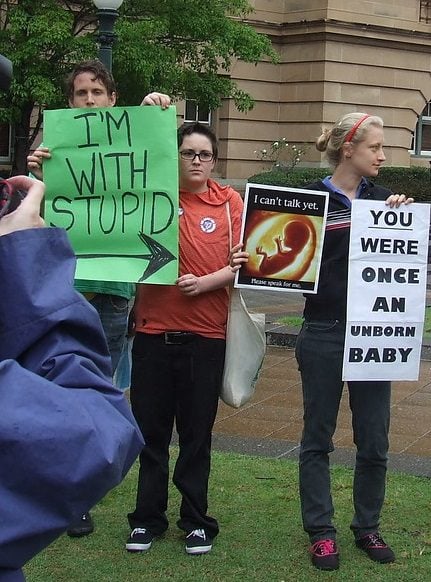
* * * * *
In the abortion debate, would you find it acceptable to call the “pro-choice” position “anti-life” or even just “pro-abortion”?
Yes, having been a pro-life activist and having thought a lot about the question of terminology here as well.
Let’s face it, it really is anti-life, even if that is not the intent of the people involved, and it really is, technically, “pro-abortion.”
Not just technically, but very practically, in end result, I would say.
But those who hold that view do not like those terms because of what they imply–namely, that they don’t care about life and that abortion is the main thing to them when freedom of choice is really their burden.
Again, this accepts the terms of the opponent and ultimately involves compromise of principle. We are not obliged to ever do that simply in order not to offend someone. We don’t buy the whole anti-life mentality and change our terms, when ours are accurate. We know that the abortionists and proponents of this wickedness are uncomfortable with terminology precisely because its objective meanings and use expose what they advocate: child-killing; wanton destruction of innocent human life, etc. We don’t change our description and accept theirs simply so they won’t be offended!
Arguably, this prolongs the same mentality and denial of what is going on, by granting inaccurate terms.
“Pro choice” is itself a ridiculous use of English, for the question immediately arises: “choice to do what?” E.g., people speak of educational “choice” with regard to vouchers. But everyone knows that choice of schools is the “choice” referred to. Likewise, the “choice” in abortion involves an intrinsically immoral “choice” to kill (more specifically and precisely, murder) a preborn child. We merely point out that our opponents ought to be accurate in what they desire.
If our opponents were truly for a “woman’s right to choose,” as they say, then why do they invariably oppose Crisis Pregnancy Centers, informed consent laws, and requirements to have abortion fully explained to them before having one? Therefore, all of the foregoing suggests that they are much more accurately described as “pro-abortion.”
Besides, their chosen term for us is “anti-abortion.” I have said many times that I don’t mind that, as it is accurate. I am against abortion. What I do mind is the double standard routinely employed by the media and politicians, and academicians. They call us that, but insist on “pro-choice” for themselves. Besides the deficiencies outlined above, this applies a double standard by suggesting that they are primarily for something, while we are merely against something (i.e., the connotation of positive vs. negative).
They don’t want to say they are “for” killing, so they use the innocuous, very American- and libertarian-sounding word “choice.” This was a conscious, deliberate strategy on their part. But I say that the accurate parallel would be:
“anti-abortion” <————–> “pro-abortion”
This would show that one party opposes abortion, while the other “espouses” it in the sense that they think it should be legal, and that there is nothing ethically wrong with it.
Or, another fair use would be:
“Pro-Life” <————–> “Pro-Choice”
At least this would call both sides their own preferred title, even though “pro-choice” is a ridiculous, sloganistic butchery of the English language, especially when referring to savage child-killing.
Or:
“Pro-Life” <————–> “Pro-Abortion”
One side favors the protection of preborn human life; the other does not. That is an objective fact, especially for those who also oppose the death penalty (since that objection comes up so often).
But that’s not good enough. These people have to pick their own chosen term for us, anti-abortion (rather than our self-title), and use their own name (pro-choice) for themselves. That is the double standard, and I utterly despise such tactics. We see the same sort of thing in historiography, which is suffused with anti-Christian and anti-Catholic bias. The Christian-dominated periods of history are referred to as “The Dark Ages” (where such “dark” things as hospitals, capitalism, universities, glorious cathedrals, and printing were developed).
Much more accurate and non-pejorative would be famous historian Will Durant’s term “The Age of Faith.” That implies that subsequent periods have lost faith rather than gained extraordinary intelligence and wisdom which the medievals supposedly lacked, having been allegedly enslaved by the wicked Catholic Church. Likewise, with “Enlightenment.” The lights came on in 18th-century France (while heads rolled down the streets like bowling balls, one after another). What a joke!
Now, however much I disagree with them and however much I want their position to be seen for the abhorrence that it is (as I’m sure you agree with me), labeling them things like “pro-abortion” or “anti-life” is not the way to accomplish this. It is simply unfair because it communicates this truth simply by a label rather than by rational argumentation.
I completely disagree. I think the terminology as I discussed it above is the rational and fair way of going about it. Fighting abortion is not a Madison Avenue PR campaign. The pro-abortionists are the ones distorting the English language, and for the worst possible reasons. Why am I required to imply (very subtly) that I go along with their worldviews by using this warped terminology?
Arguably, that prolongs the practice of legal abortion, because we grant them their wicked categories of thought. All revolutions seek to change terminology in order to succeed. Thus Marxism had denigrating terms for capitalists and rich people. The Sexual Revolution turned debauchery, whoring, and philandering into “free love” and “try before you buy.” The old “bad girls” or “loose women” became “sensible career women” and male lechers and sexual predators became simply “[sexually active] bachelors” and “single guys [expected to indulge].”
The abnormal became “normal”; the immoral “moral” or a “lifestyle choice” which no one can “judge.” Nazism had a number of epithets for Jews. Bigoted white Americans had offensive terms for black people, and some blacks returned the favor. The goal now is to dehumanize the preborn child, so that the sin of murdering it is sugar-coated. And you want to grant them this goal of distorting terminology out of — in my humble opinion — a false sense of what “charity” is?
Or, if you disagree with that, there is another reason: it just seems that grace calls us to concede here and avoid the terms this movement says unfairly characterizes them.
I deny that it is unfair, but I am willing to call them “pro-choice” if they will refer to us routinely as “pro-life.” Or I will accept “anti-abortion” as long as they call themselves “pro-abortion” (which I believe is the most fair, sensible compromise).
The abhorrence of their position can be seen through other means; we don’t need to use labels to do that. And, for the sake of harmony, we shouldn’t use labels to do that.
Let them reciprocate, and I am willing, as I said. I will not use “pro-choice” until then, because it is both inaccurate and incomplete, and represents the worst sort of cynical propaganda and unconcern for “the truth, the whole truth, and nothing but the truth.”
(originally 11-23-00)
Photo credit: David Jackmanson (10-9-09): Pro Choice Rally, Queens Park, Brisbane, Queensland, Australia [Flickr / CC BY 2.0 license]
***













